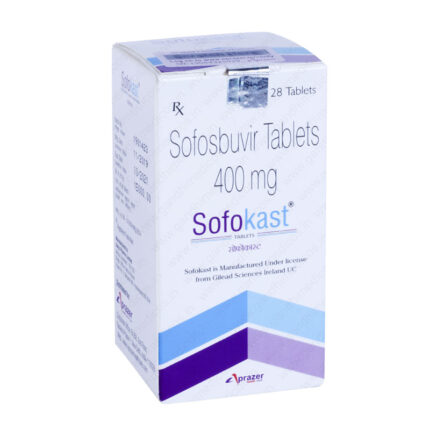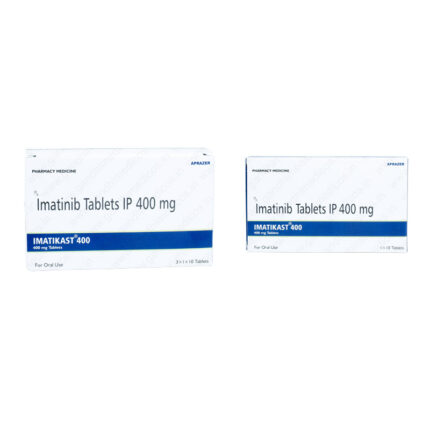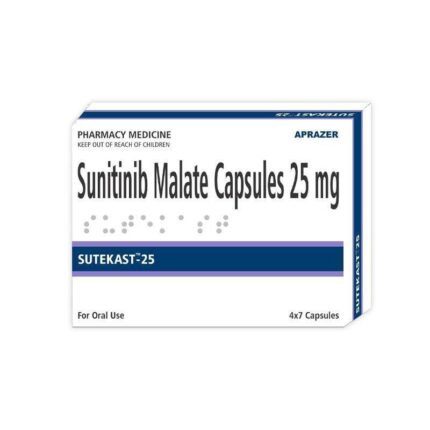Aprazer
Sorafekast
| Product Name | Sorafekast |
| Dose/Strength | 200 mg |
| Packaging Size | 30 Tablets |
Sorafekast 200mg is manufactured by BDR Pharmaceuticals International Pvt. Ltd. It is approved for the treatment of primary kidney cancer, advanced primary liver cancer and thyroid cancer.
Sorafekast (sorafenib) with its ability to fight against the tumors of kidney, liver and thyroid has led to an increase in cancer survival in such patients. Sorafekast ?200 mg (sorafenib) is widely known for its anti-tumor properties such as stopping the growth of tumor cells (tumor-cell proliferation) and reduction of blood flow (tumor angiogenesis) to the tumor cells. Additionally, it also speeds up the process of self-destruction of the cells (Apoptosis).
Sorafekast ?(sorafenib) is utilized in patients suffering from different cancer types namely,
- Kidney [Advanced Renal cell carcinoma (RCC)]
- Liver [Unresectable hepatocellular carcinoma (HCC)]
- Thyroid [Locally advanced and metastatic differentiated thyroid carcinoma (DTC)]
Dosage, Mode of Action, and Administration of Sorafekast ?(sorafenib):
Sorafenib is given orally with the recommended dosage of 400 mg (2 red, film-coated tablets of 200 mg) twice daily without food. It is taken at least 1 hour before or 2 hours after a meal. Once sorafenib enters our system, more than 38-49% of the tablet is absorbed (bio-available) in the body which is further metabolized in the liver. It is known for slowing down the activities of multiple proteins/enzymes (intracellular and cell surface kinases) that are involved in the growth of cancerous cells. Lastly, sorafenib is completely expelled from the body after 14 days.
Efficacy of Sorafekast ?(sorafenib):
Sorafenib is one of the most highly prescribed oral drug formulations due to the amicable efficacy of the drug. The table below shows the effectiveness of sorafenib in terms of overall survival (OS) in months in comparison to dummy drug (placebo).
Table: Effectiveness of Sorafekast ?(sorafenib)
| Type of disease | Advanced RCC | Unresectable HCC | Locally advanced and metastatic DTC |
| Organ affected | Kidney | Liver | Thyroid |
| No. of patients | 602 | 903 | 417 |
| Trial Outcome | The OS of patients after Sorafenib was significantly higher (10.7 months) as compared to placebo (7.9 months). | The OS was greater in Sorafenib group (5.5 months) as compared to the placebo group (2.8 months). | A two-fold increase in OS of Sorafenib group (10.8 months) was observed than the placebo group (5.8 months) |
When should Sorafekast ?(sorafenib) be avoided?
- If patients are suffering from heart problems, chest pain, or have high blood pressure
- If patients have undergone any surgical procedures recently
- If they have bleeding complications, abnormal levels of magnesium, potassium, and calcium
- If they are pregnant or planning to get pregnant
- In case of stomach and intestinal complications, sorafenib should be immediately stopped
- If liver functions are abnormal (elevated levels of transaminase enzymes)
- If ECGs and electrolytes get overall increased (ventricular arrhythmias)
- Decreased or discontinued in patients with severe skin reactions (Steven-Johnson syndrome or toxic epidermal necrolysis)
Possible side-effects of Sorafekast ?(sorafenib):
As clinical trials are carried out in varied conditions under observation, side-effects in these trials are not reflected in the overall safety of the drug in the actual practice. According to the trials, the safety profile of sorafenib is well tolerated with minimal side-effects differing from patient to patient.
Most common ones are:
- Nausea
- Abdominal/ stomach pain
- Loss of appetite
- Weight loss
- Diarrhoea
- Tiredness
- Hand, foot or skin rashes or reactions
Serious side-effects are:
Heart attack/failure: Patients should be immediately checked for chest pain, shortness of breath, increased heartbeat, nausea, swelling in the lower part of the legs, and high sweating
Increased bleeding: A most common side-effect of sorafenib. Doctors should be immediately informed if patients are seen with any signs of bleeding
To conclude, Sorafekast ?(sorafenib) with a better overall survival rate could be a recommended option in patients with advanced RCC of the kidney, unresectable HCC of the liver, and DTC of thyroid causing minimal side-effects.

 Hepatitis C
Hepatitis C HIV
HIV Transplant Medicine
Transplant Medicine Respiratory System
Respiratory System














Reviews
There are no reviews yet.